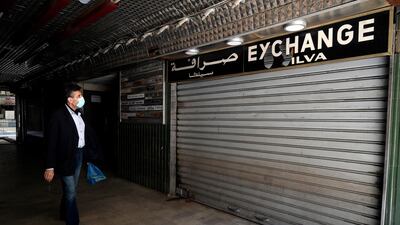Lebanon's private sector shrunk at a slower pace in March, with business conditions hitting a 17-month high due to a slower decline in output and new orders.
The Blom Lebanon PMI, which measures operating conditions in the Lebanese private sector, rose to 46.4 in March from 42.2 in February, but remained below the 50.0 mark that separates growth from contraction.
The PMI reading was driven mainly by slower contractions in output and new orders indexes that each hit 43.2 at end of the first quarter 2021, said Tala Nasrallah, senior research analyst at BlomInvest Bank.
"Business expectations remain very depressed, marred by political instability, liquidity constraints and lower purchasing power," she said.
Lebanon is in the grip of the worst economic crisis since the end of a 15-year civil war in 1975. The currency has lost 90 per cent of its value against the US dollar, soaring inflation has driven more than half the population below the poverty line following the country's default on eurobonds, and banks have all but cut customers off from their dollar deposits.
The slower downturn in the private sector in March was partially due to a softer fall in output and in new orders received by Lebanese firms, which reached the slowest rate of reduction since October 2019, Blom Bank said.
The ongoing downturn points to clients' lower purchasing power, following a sharp rise in the relative value of the US dollar, according to the firms surveyed.
Lebanese companies in the private sector faced a sharp rise in costs last month. Annual inflation, which reached 85 per cent in 2020, accelerated at the fastest pace since June 2020. It was the fifth-fastest since data collection began in May 2013. The increase was driven by a sharp rise in purchase prices caused by US dollar liquidity issues.
Selling prices rose as firms chose to pass on some of the additional costs to their customers in March.
Following the first stabilisation for 18 months in February, there was a fresh downturn in private sector employment during March. However, the rate of job shedding was only marginal.
The surveyed companies' business outlook remained at "rock bottom" in March, with 100 per cent of respondents forecasting a decline in output over the coming year and many citing ongoing political instability as a primary cause of pessimism.
The collapse of the Lebanese pound that incited double-digit inflation, following a shortage in foreign currency liquidity led to a sharp rise in output costs, Ms Nasrallah said. The Lebanese private sector relies on imports to secure basic needs, despite the subsidisation of essential goods.
Political bickering and the country's economic woes were compounded following a massive explosion at the Port of Beirut in August that killed more than 200 people and devastated large parts of the capital.
"Enhancing business conditions necessarily depends on a new government formation and [an] effective action plan to reverse the lingering economic crisis," Ms Nasrallah said.


